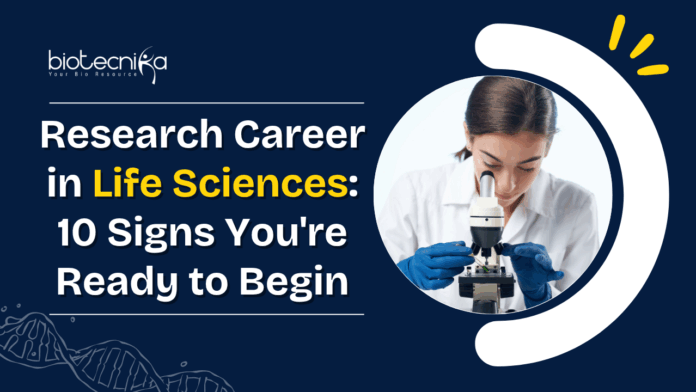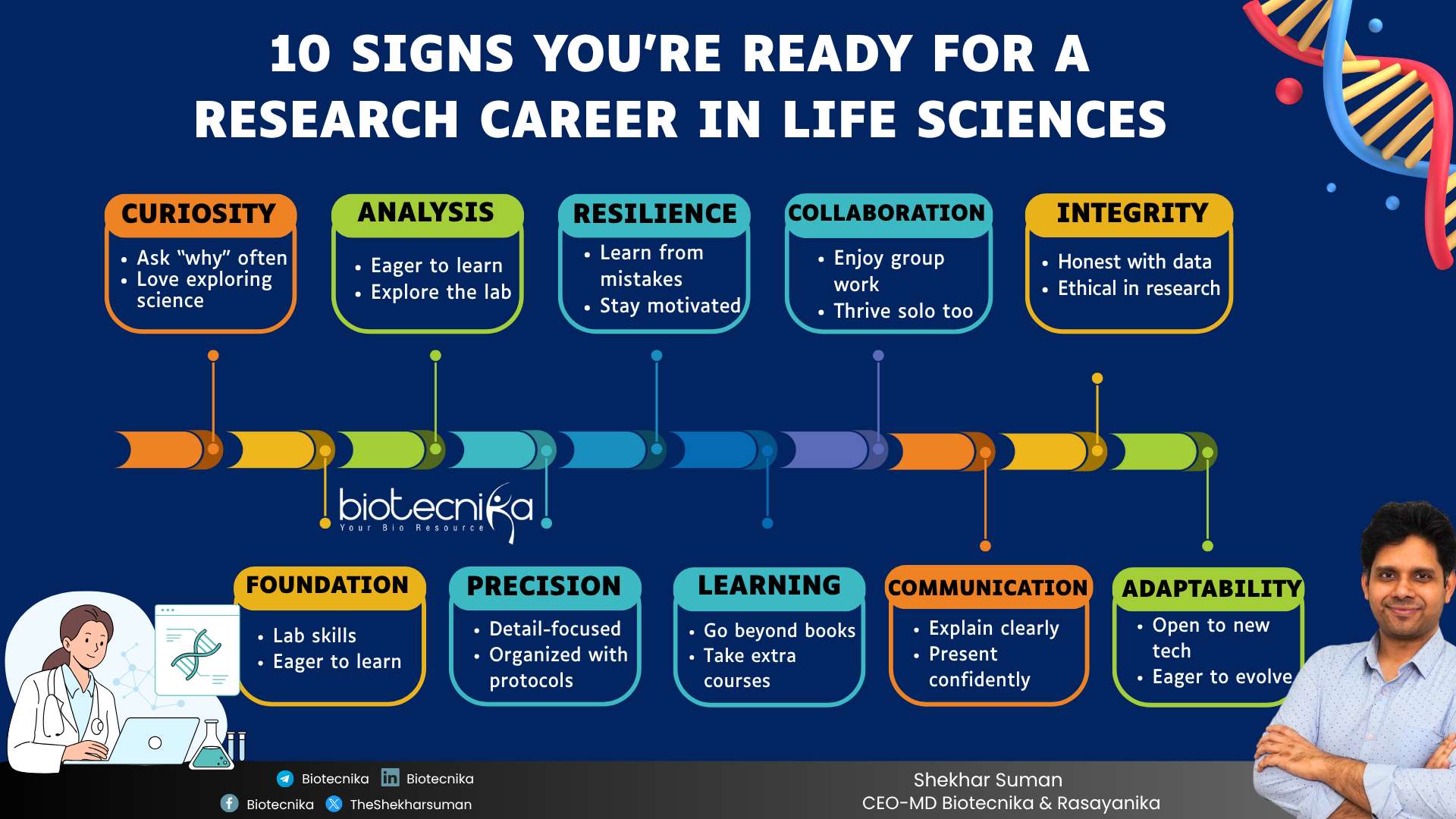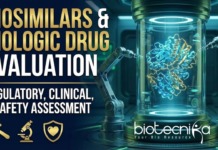Research Career in Life Sciences: 10 Signs You’re Ready to Begin
Somewhere between late-night lab reports and daydreaming about being a part of the next innovation, a question starts to simmer: Am I ready for a research career in life science? If you have felt that itch, that nudge of curiosity that doesn’t go away, you are not alone.
The pull towards a research career in life science is quite thrilling. No one notices the hidden questions, lab notebook doodles, or the unsolved puzzles for biotech freshers and life science students standing at the crossroads of possibilities. The signs are often already there. They may not come as flashing lights but as instincts, habits, curiosities, and subtle learnings that hint at a deeper calling.
You don’t need to spend hours figuring out whether you are ready for a research career in Life sciences. If you find yourself nodding your head to these 10 signs, then you might be more prepared than you think.
Let’s walk through them together.
- You’re Driven by Genuine Curiosity
Let’s begin with something that is the driving force of every great researcher. Do you find yourself diving deep into topics just because you want to know more? Have you ever found yourself wondering about why bacteria behave the way they do? Or what would happen if you combine this protein with that enzyme?
Curiosity is the foundation of every discovery. If you are someone who constantly questions the status quo or loves learning new things for the sake of it, then you are already thinking like a scientist.
- You Have a Solid Scientific Foundation (Or Are Willing to Build One)
To be research career-ready, you don’t need a PhD yet. However, building a strong foundation is essential in life science. Even a little coding gives you an edge. If you are the kind of person who volunteers for extra lab time, joins research clubs, or designs a research protocol. You are definitely on the right track.
And do you know what the best part is? You don’t need to know everything. You just need the drive to learn.
- You Think Critically and Analyze Deeply
Research in life science is not about memorizing facts. It’s about understanding systems, spotting patterns, and asking the right questions.
Let’s understand this with a situation. What will you do if your PCR doesn’t yield results? Do you panic or do you troubleshoot? Thinking critically and adapting your methods makes a huge difference.
Research is not always about getting the “right” answer. It’s about following the trail and letting the data lead the way, even if it surprises you.
- Details Matter to You (Maybe a Little Too Much!)
Are you someone who notices a missing decimal point on a chart? Do you love color coding your notes, labeling every sample, or tracking every step in your protocol? That is not being obsessive. That’s being a researcher.
In life science, tiny details matter. They have big implications. A miscalibrated pipette or a misread pH level can hamper your months of hard work. If precision and organization come naturally to you, it indicates that you are already practicing the discipline research demands.
- You’re Okay with Failing—A Lot
While the world talks about success, it’s important to understand that failure is part of it. As a life science graduate, you would have seen experiments failing.
You need to understand that failure in research is not a dead end. It’s feedback. If you can bounce back from your setbacks, rethink your strategy, and stay motivated, you have one of the most important traits. The trait that makes you ready for a research career in life science is resilience.
Next time, when you meet a scientist, ask them about failure. They will for sure tell you that persistence beats perfection every time.
Challenges in Research and How to Overcome Them
| Challenge | Typical Reaction | Recommended Response |
| Failed experiment | Frustration, quitting | Analyze, adjust, retry |
| Long hours | Burnout | Prioritize and plan breaks |
| No immediate results | Doubt your abilities | Focus on long-term goals |
- You’re a Self-Starter Who Loves Learning Independently
In the world of research, nobody will hold your hand and walk you through. While teamwork is essential, remember that the best scientists are those who take charge of their learning and development.
Do you run to PunMed when you are stuck? Do you enroll in MOOCs for fun? During weekends, do you wonder how AI will change biological research? That hunger for self-directed learning is not just admirable. It’s essential.
Being a lifelong learner is part of the job description in a research career in life science.
- You Collaborate—But Thrive on Independence Too
In today’s advancing research world, scientific researchers cannot survive alone. Projects often involve interdisciplinary teams, biologists, data scientists, engineers, and clinicians.
If you enjoy working with people, sharing knowledge, and contributing to a shared goal, you will succeed in this space.
But you also need to have the ability to work together. There will be times when it’s just you, your samples, and your notebooks. You have to be comfortable with both scenarios. This is a clear sign that you are research-ready.
- You Communicate Clearly—Yes, Even About Complex Stuff
Whether you are presenting a poster at a conference, explaining an idea to your supervisor, or writing a research paper, communication is key.
Can you explain your research to your non-scientific friends? So you write clean, and compelling abstracts? Are you the go-to person for explaining things in your group?
Clear communication has the power to bridge the gap between good science and impactful science.
- You’re Big on Ethics and Scientific Integrity
Now, let’s be honest about ethics and scientific integrity: research that is not performed ethically can be dangerous.
If you understand the importance of data integrity, ethical treatment of animals and humans, and responsible publishing, you are thinking like a professional scientist.
Scientific progress must be built on trust. If you take that seriously, your contributions will carry more weight in the research community.
- You Embrace Change and Stay Adaptable
The technology is evolving, methods are shifting, and discoveries are emerging almost every day. In this fast-paced world, being adaptable is your superpower.
You may start your research career in life science in a wet lab, but you need modern tools. Your curiosity may lead you towards bioinformatics. Or maybe you have dabbled in CRISPR or are exploring AI in drug discovery. The ability to evolve within your field is one of the clearest signs indicating that you are ready for a research career in life science.
Keep learning, keep adapting, and you’ll keep thriving.
Are You Ready to Step Into the World of Life Science Research?
If you see yourself in even half of these signs, you are already on your way to building a strong and impactful research career in life science. A career in life science is more than a job. It’s a journey of discovery, challenge, and purpose. It’s for those who dare to ask, dig, fail, and try again.
Whether you are aiming for academic success, or viotech, pharma, or an interdisciplinary role, these traits are your launchpad. Start with internships, connecting with mentors, attending seminars, or even taking on mini research projects. The path might not always be easy, but it’s always worth it.
The life science world needs thinkers like you.





























